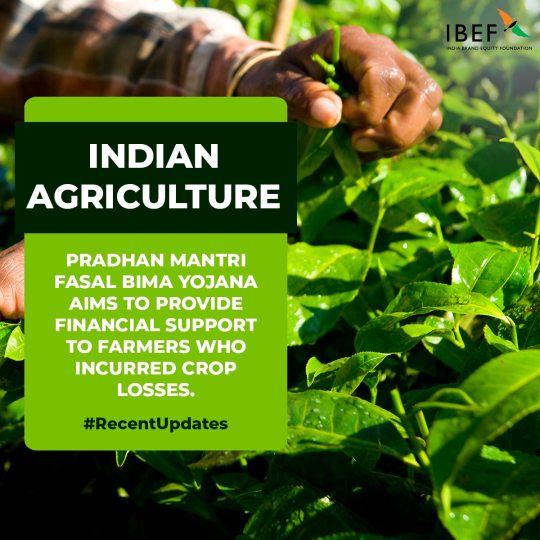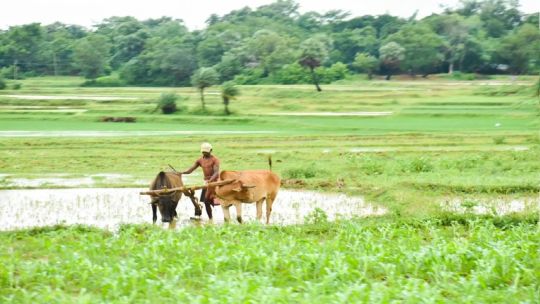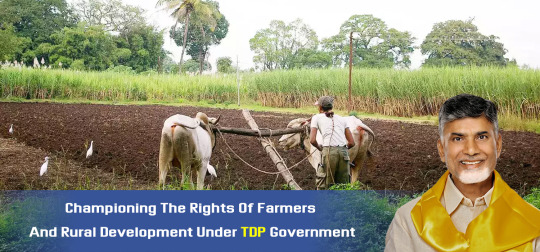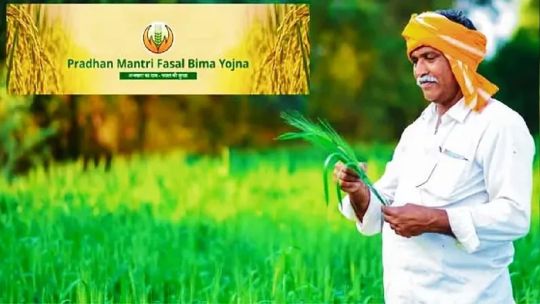#pmfby scheme
Text
youtube
Understand The Pradhan Mantri Fasal Bima Yojana For Crop Insurance |SBI General Insurance
Uncover the financial security behind Pradhan Mantri Fasal Bima Yojana. SBIG video guide breaks down the enrollment process, transparent claim settlements, and the government's commitment to supporting farmers. Watch now for a stronger agricultural future!
https://www.sbigeneral.in/pradhan-mantri-fasal-bima-yojna
#pradhan mantri fasal bima yojana#fasal bima yojana#pmfby scheme#pmfby insurance#pmfby scheme details#Youtube
0 notes
Text

Crop Protection Made Easy with Pradhan Mantri Fasal Bima Yojana
Discover the simplicity of crop protection with the Pradhan Mantri Fasal Bima Yojana (PMFBY), a flagship initiative by the Department of Agriculture, Cooperation and Farmers’ Welfare. Under the National Agricultural Insurance Scheme, the scheme ensures seamless coverage for farmers nationwide, adhering to the principle of "One Nation, One Crop, One Premium." This innovative PMFBY Scheme safeguards farmers against unpredictable crop losses, providing financial security and promoting sustainable agriculture. Explore the user-friendly features and comprehensive benefits of the PM Fasal Bima Yojana to make informed decisions for a resilient farming future. Embrace the ease of crop protection with the Pradhan Mantri Fasal Bima Yojana today.
#pradhan mantri fasal bima yojana#PMFBY scheme#PMFBY#PM Fasal Bima Yojana#National Agricultural Insurance Scheme#government scheme
0 notes
Text
प्रधानमंत्री फसल बीमा योजना से जुड़ी कंपनियों नें पांच सालों में कमाए 40,000 करोड़ रुपए
प्रधानमंत्री फसल बीमा योजना से जुड़ी कंपनियों नें पांच सालों में कमाए 40,000 करोड़ रुपए
देश में किसानों को फसल नुकसान का मुआवजा दिलाने के लिए फसल बीमा योजना चलायी जाती है. योजना के शुरू हुए थह साल हो चुके हैं. इसमें देश की 15 बीमा कंपनियां शामिल है. रिपोर्टेस के मुचाबिक इन कंपनियों ने पिछले पांच सालों में 40,000 करोड़ रुपए की कमाई की है.
फसल बीमा करने वाली कंपनियों ने पांच साल में कमाए इतने रुपए
Image Credit source: File Photo
देश नें किसानों को विभिन्न कारणों से हुए फसल के नुकसान…

View On WordPress
0 notes
Text
Over 1.7-crore farmers have been given the benefit of crop insurance at Re 1 but who will ensure that the insurance companies compensate them judiciously for the crop losses farmers suffer? We have seen reports of Rs 15, Rs 100 and Rs 200 and so on, paid to farmers for crop losses. Crop insurance is touted as a big benefit for farmers, but the data shows that private insurance firms have walked away with profits of Rs 57,619-crore since the scheme began in 2016. In reality, PM Fasal Bima Yojna (PMFBY) seems to be a scheme that ensures large profits for the bima companies.
Devinder Sharma, ‘Incredible India! Wilful defaulters buy properties; farmers offer to sell body organs to pay-off loans’, Bizz Buzz
2 notes
·
View notes
Text
Government Schemes For Landlords
The effectiveness of any Government scheme depends on its implementation. In India, approximately 60 per cent of the world's open defecators practice the open defecation method. Within a few years, the number of open defecation cases decreased and rural India has become open-defecation free. The intensity and passion of engagement amongst stake holders helped create connections and buy-in from key stakeholders. In fact, the Government scheme helped close the open defecation problem across rural India.
Rent Control Act
The Rent Control Act outlines the landlord's rights and responsibilities under the rental agreement. While it is possible for landlords to charge more rent, they can't evict tenants without valid reasons. Moreover, landlords cannot terminate a lease simply because they don't have the money to pay the rent. The Rent Control Act provides landlords with three important rights and responsibilities. These rights are:
Saksham Yojana scheme
The government has announced a new initiative called the Saksham Yojana scheme, which provides direct financial support to farmers. sarkari yojana helps farmers meet their credit needs, including purchasing farm equipment, seeds, and fertilizer. The aim of the scheme is to make farming in India more sustainable and profitable. For those who need a little extra help, the program also provides loans to help them purchase land. Interested applicants can apply here for a loan.
Pradhan Mantri Adarsh Gram Yojana
The Pradhan Mantri Adarshgram Yojana is a rural development scheme launched by the central government of India. It is targeted at villages with high rates of poverty. The scheme aims to provide clean water, sanitary conditions, improved agricultural practices, and sanitation facilities to communities. Those who want to apply for the scheme must submit an application form.
PMFBY
The PMFBY Government scheme is a voluntary program offered to farmers across the country. Farmers can apply if they are growing one or more of the qualifying crops. These are generally commercial crops. However, the scheme also covers horticultural crops. Farmers can file a claim if they are prevented from planting or sowing crops for any reason. The amount of cover is up to 25% of the insured amount. The program is currently voluntary and available to all states in the country.
PM Cares Fund
PM Cares Fund is a government scheme to help children whose parents have passed away. The government provides financial assistance for children and the children can apply for the benefits. Those children must be below 18 years of age at the time of the death. The scheme is coordinated with the Ministry of Women and Child Development (MWCD) and district nodal agencies. Beneficiaries of the scheme receive the funds through District Magistrates.
2 notes
·
View notes
Text
India General Insurance Market : A Comprehensive Overview
The general insurance market in India is a dynamic and rapidly growing sector within the country's broader insurance industry. General insurance, also known as non-life insurance, covers a wide range of risks and provides financial protection against unforeseen events that can result in financial losses. Here is an overview of the India general insurance market:
Market Size and Growth: The general insurance market in India has experienced significant growth in recent years. With a large and diverse population, increasing awareness about insurance, and a growing middle class, the demand for general insurance products has been on the rise. The market is characterized by both domestic and international insurance companies competing for market share.
Product Portfolio: General insurance in India encompasses a variety of products tailored to meet the needs of individuals, businesses, and industries. Some of the common general insurance products include motor insurance (covering cars, bikes, etc.), health insurance, home insurance, travel insurance, marine insurance, fire insurance, and liability insurance, among others.
Regulatory Framework: The Insurance Regulatory and Development Authority of India (IRDAI) is the regulatory body that oversees and regulates the insurance industry in India, including the general insurance sector. It ensures that insurance companies comply with regulatory norms, maintain solvency margins, and provide fair terms to policyholders.
Competition: The Indian general insurance market is highly competitive, with both public and private sector insurance companies operating in the sector. Some of the well-known insurance companies in India include LIC, ICICI Lombard, Bajaj Allianz, HDFC ERGO, and many others.
Distribution Channels: General insurance products are sold through various distribution channels, including insurance agents, brokers, bancassurance (insurance products sold through banks), and digital platforms. The advent of technology has made it easier for customers to purchase policies online and file claims digitally.
Government Initiatives: The Indian government has introduced several initiatives to increase insurance penetration in the country. The Pradhan Mantri Fasal Bima Yojana (PMFBY), for example, aims to provide crop insurance to farmers, while the Ayushman Bharat scheme seeks to make healthcare more accessible through health insurance coverage for economically disadvantaged families.
Challenges: The general insurance market in India faces various challenges, including issues related to fraud, pricing adequacy, and underinsurance. Additionally, the industry must adapt to changing customer preferences and emerging risks, such as cybersecurity and climate change-related events.
Future Outlook: The future of the India general insurance market looks promising, with continued growth expected due to rising awareness, an expanding middle class, and increased insurance penetration. Insurers are likely to focus on innovative product offerings, digitalization, and customer-centric approaches to remain competitive.

In conclusion, the India general insurance market is a vibrant and evolving sector, driven by the diverse insurance needs of a large population. With regulatory oversight and competition, insurance companies are continuously adapting to meet the changing demands of consumers and businesses in India.
To gain more information about the India general insurance market forecast, download a free report sample
0 notes
Text
Championing The Rights Of Farmers And Rural Development Under TDP Government
The Telugu Desam Party (TDP), led by the dynamic leadership of N Chandrababu Naidu, has emerged as a prominent political force in Andhra Pradesh, renowned for its unwavering commitment to the welfare of farmers and rural development. With a strong focus on agricultural policies, the TDP has implemented numerous initiatives to uplift the agricultural sector, empower farmers, and drive sustainable rural development. This article highlights the TDP's dedication to championing the rights of farmers, showcasing their Top TDP Achievements, significant TDP Contributions, and commitment to providing Live TDP Updates to the public. The TDP takes pride in its cadre of Members of the Legislative Assembly (MLAs), who serve as advocates for the rights and interests of farmers. These TDP MLAs have been instrumental in championing various agricultural policies and measures to improve the lives of farmers in Andhra Pradesh. Through their active participation in legislative discussions and constituency engagements, TDP MLAs have strived to address the challenges faced by farmers and ensure their concerns are heard at the highest levels of government. Their relentless efforts have played a pivotal role in shaping farmer-centric policies and fostering sustainable rural development.

Under the visionary leadership of N Chandrababu Naidu, the TDP government has accomplished significant milestones in empowering farmers and revolutionizing the agricultural landscape of Andhra Pradesh. The TDP government introduced the Rythu Bandhu scheme, which provides financial assistance to farmers for every acre of agricultural land they own. This initiative has provided much-needed financial support to farmers and encouraged agricultural productivity and sustainable farming practices. Recognizing the importance of irrigation for agricultural growth, the TDP government undertook several irrigation projects, including the completion of the Polavaram project. These initiatives have significantly increased the irrigation potential in the state, ensuring water availability for farming throughout the year. The TDP government implemented crop insurance schemes, such as the Pradhan Mantri Fasal Bima Yojana (PMFBY), to safeguard farmers against crop losses due to natural calamities. This has provided a safety net for farmers, protecting them from financial distress caused by unforeseen circumstances. The TDP has made substantial TDP Contributions to rural development in Andhra Pradesh. The party recognizes that a holistic approach to rural development encompasses various sectors beyond agriculture. The TDP government, under the leadership of N Chandrababu Naidu, focused on infrastructure development, education, healthcare, and employment generation in rural areas. The implementation of programs such as the Smart Village-Smart Ward initiative, Nadu-Nedu (renovation of government schools), and the Skill Development Mission has played a pivotal role in improving the quality of life for rural communities.
The TDP has embraced technology to provide Live TDP Updates and ensure public engagement in its initiatives. Through various digital platforms, including social media channels and dedicated websites, the TDP disseminates real-time information about farmer-centric policies, welfare programs, and government initiatives. This commitment to transparency and public communication enables farmers and rural communities to stay informed and actively participate in the decision-making process. Telugu Desam Party, led by N Chandrababu Naidu, has consistently demonstrated its commitment to championing farmers' rights and promoting rural development in Andhra Pradesh. Through its dedicated TDP MLAs, the party has been instrumental in shaping farmer-centric policies and advocating for their welfare. The party's notable Top TDP Achievements, such as the Rythu Bandhu scheme and irrigation development, have significantly empowered farmers and transformed the agricultural landscape. Furthermore, the TDP's Contributions to rural development beyond agriculture have fostered holistic growth in rural communities. By providing Live TDP Updates and embracing public engagement, the TDP ensures that farmers and rural residents are informed and actively participate in the governance process. As Andhra Pradesh progresses, the Telugu Desam Party remains steadfast in its commitment to farmers and rural development, fostering a brighter future for the state's agrarian communities.
#Guntur news today telugu#Guntur news today live#Guntur political leaders#Guntur political party#Guntur mla seats
0 notes
Text
N Chandrababu Naidu's Initiatives for Promoting Sustainable and Climate-Resilient Agriculture in Andhra Pradesh
Under the leadership of N Chandrababu Naidu and his TDP Party led government, Andhra Pradesh has witnessed significant strides in promoting sustainable and climate-resilient agriculture practices. With a strong commitment to the well-being of farmers and the environment, the TDP government has implemented a range of initiatives, schemes, and policies to ensure a sustainable agricultural sector.
As the TDP government prioritized sustainable agriculture, live updates on the party's agenda for this sector were regularly shared with the public. N Chandrababu Naidu consistently emphasized the need to adopt innovative farming techniques, conserve natural resources, and mitigate the impact of climate change on agriculture. These updates helped keep farmers and stakeholders informed about the government's initiatives and created a sense of transparency.
One of the flagship TDP programs launched by the TDP Leader was the promotion of Zero Budget Natural Farming. This method aimed to reduce farmers' dependence on external inputs such as fertilizers and pesticides. Under this scheme, farmers were trained in organic farming practices, composting, and biofertilizer production. By minimizing costs and protecting soil health, ZBNF empowered farmers and contributed to sustainable agricultural practices. Go through the TDP website for more political news and live updates on your district.
To address the issue of water scarcity, the N Chandrababu Naidu introduced solar-powered irrigation systems across the state. These systems utilized solar energy to power water pumps, reducing the reliance on conventional electricity and minimizing the environmental impact. This initiative not only improved irrigation efficiency but also reduced farmers' energy expenses, making agriculture more sustainable and cost-effective. Go through the TDP website for more irrigational projects and regional news initiated by TDP.
The TDP government actively promoted crop diversification to ensure the long-term sustainability of agriculture. By encouraging farmers to cultivate a wide range of crops, including pulses, millets, and oilseeds, the government aimed to enhance food security, boost income generation, and reduce the vulnerability of farmers to price fluctuations. Crop diversification also played a crucial role in soil health management and mitigating the risks associated with monoculture.
Recognizing the challenges posed by climate change, the TDP government focused on the adoption of climate-resilient farming practices. This involved the dissemination of climate-smart techniques such as precision farming, protected cultivation, and integrated pest management. By equipping farmers with these practices, the government aimed to enhance productivity, minimize crop loss due to extreme weather events and build resilience in the agricultural sector. Go through the TDP website of your district for more initiatives and contributions of N Chandrababu Naidu.
The TDP government launched the Rythu Raksha scheme to provide financial assistance to farmers. Under this program, eligible farmers received an annual payout to support their agricultural activities and address income uncertainties. This scheme aimed to enhance farmers' economic stability and incentivize sustainable farming practices.
The TDP government actively promoted the PMFBY, a crop insurance scheme launched by the central government. By encouraging farmers to enroll in this scheme, the government aimed to protect them from crop failures, natural disasters, and price fluctuations. This policy provided a safety net for farmers, fostering sustainability and resilience in agriculture.
0 notes
Text
Government Schemes for agriculture in India
There are several government agriculture schemes in India aimed at supporting and promoting agriculture. Here are some of the major schemes:
Pradhan Mantri Kisan Samman Nidhi (PM-KISAN): This scheme provides direct income support to small and marginal farmers. Under PM-KISAN, eligible farmers receive Rs. 6,000 per year in three equal installments directly into their bank accounts.
Pradhan Mantri Fasal Bima Yojana (PMFBY): It is a crop insurance scheme that provides financial protection to farmers against crop losses due to natural calamities, pests, and diseases. The premium rates are subsidized, making it affordable for farmers.
Rashtriya Krishi Vikas Yojana (RKVY): This scheme aims to support the development of agriculture and allied sectors by providing financial assistance to states. It funds various activities such as crop diversification, infrastructure development, post-harvest management, and research and development.
National Food Security Mission (NFSM): NFSM aims to increase the production of rice, wheat, and pulses to ensure food security. It promotes the adoption of improved technologies, seeds, and farming practices to enhance productivity and increase farmers' income.
Paramparagat Krishi Vikas Yojana (PKVY): This scheme promotes organic farming practices and supports farmers in adopting organic farming systems. Financial assistance is provided for training, certification, and the creation of infrastructure for organic farming.
Pradhan Mantri Krishi Sinchai Yojana (PMKSY): PMKSY focuses on increasing water efficiency in agriculture. It aims to enhance irrigation infrastructure, promote precision irrigation, and improve water use efficiency on farms.
Soil Health Card Scheme: This scheme provides soil health cards to farmers, which contain information about the nutrient content and fertility status of their soil. It helps farmers make informed decisions regarding the application of fertilizers and soil amendments.
e-NAM (National Agriculture Market): e-NAM is an online platform that enables farmers to sell their produce directly to buyers across the country. It aims to create a unified national market for agricultural commodities and reduce intermediaries, ensuring better price realization for farmers.
These are just a few examples of the government schemes for agriculture in India. The government continues to introduce and implement various other schemes and initiatives to support farmers and promote agricultural development in the country.
0 notes
Text
Top 5 Central Government Scheme For Farmers
Farming is an important sector in India, and the Central Government has introduced several schemes to support farmers and improve their livelihood. These schemes aim to provide financial assistance, agricultural inputs, and other resources to farmers to boost their production and income. In this article, we will discuss the top 5 Central Government schemes for farmers in India.
Pradhan Mantri Fasal Bima Yojana:
The Pradhan Mantri Fasal Bima Yojana (PMFBY) is a crop insurance scheme launched by the Government of India to provide financial support to farmers in case of crop failure due to natural calamities, pests, or diseases. This scheme was launched in 2016 and has since then benefited millions of farmers across the country. Under this scheme, farmers are required to pay a nominal premium, and the rest of the cost is borne by the government. The scheme covers all crops and is available to all farmers who have taken a crop loan or not. PMFBY aims to provide risk management in agriculture and help farmers manage their agricultural risks.
Pradhan Mantri Krishi Sinchai Yojana:
The Pradhan Mantri Krishi Sinchai Yojana (PMKSY) is an irrigation scheme launched by the Government of India in 2015 to provide water to every agricultural field and improve farm productivity. The scheme aims to achieve convergence of investments in irrigation at the field level, expand cultivable area under assured irrigation, and improve on-farm water use efficiency. The scheme also aims to promote sustainable water conservation practices among farmers. PMKSY focuses on creating new irrigation infrastructure and maintaining the existing ones.
National Agriculture Market:
The National Agriculture Market (eNAM) is an online trading platform launched by the Government of India to connect farmers with traders and buyers across the country. eNAM aims to create a unified national market for agricultural commodities by integrating existing Agricultural Produce Market Committee (APMC) markets. This platform provides transparent price discovery and better price realization to farmers. eNAM also helps farmers in selling their products at a competitive price without intermediaries.
Pradhan Mantri Kisan Samman Nidhi Yojana:
The Pradhan Mantri Kisan Samman Nidhi Yojana (PM-Kisan) is a scheme launched by the Government of India in 2019 to provide direct income support to farmers. Under this scheme, small and marginal farmers with less than two hectares of land are eligible to receive income support of Rs 6,000 per year. The scheme aims to provide financial assistance to farmers for meeting their various needs such as purchasing seeds, fertilizers, and other inputs. The scheme is entirely funded by the Central Government and is credited directly into the bank accounts of the beneficiaries.
Paramparagat Krishi Vikas Yojana:
The Paramparagat Krishi Vikas Yojana (PKVY) is a scheme launched by the Government of India in 2015 to promote organic farming in the country. The scheme aims to encourage farmers to adopt eco-friendly and sustainable practices for improving soil health and increasing farm productivity. Under this scheme, farmers are encouraged to form groups and take up organic farming. The government provides financial assistance to these groups for inputs such as bio-fertilizers, bio-pesticides, vermicompost, and other organic inputs. PKVY also provides support for terrace farming and other innovative farming practices.
The government of India has launched various schemes for the welfare of farmers, and these schemes have played a crucial role in the growth and development of the agriculture sector. The schemes mentioned above aim to promote farming activities, enhance crop productivity, and protect the income of farmers from agricultural risks. The schemes also offer several benefits to farmers such as providing financial assistance, promoting the use of modern technologies, and enhancing farming analytics.
It is important to note that these schemes are designed to help farmers, and it is the responsibility of the government to ensure that the benefits reach the targeted audience. It is also essential for farmers to be aware of these schemes and take advantage of them to improve their livelihoods.
Overall, these central government schemes for farmers have been successful in supporting the growth and development of the agriculture sector in India, and they continue to play a significant role in promoting the welfare of farmers in the country.
1 note
·
View note
Text
I urge all farmers to avail benefits of PM Fasal Bima Yojana: LG Sinha
Jammu, February 24: In a significant move towards welfare of the farmers, the government has extended Pradhan Mantri Fasal Bima Yojana (PMFBY) to the farmers of all 20 districts of UT of J&K.
Speaking at the launching event of the extension of Pradhan Mantri Fasal Bima Yojana at SKUAST Jammu, the Lt Governor said that the scheme will provide comprehensive coverage against crop losses arising out…

View On WordPress
0 notes
Text
Benefits of Rupay Credit Card

Rupay credit cards are a type of credit card offered in India that are powered by the RuPay network. RuPay is a domestic card payment network set up by the National Payments Corporation of India (NPCI) to compete with international card payment networks such as Visa and Mastercard.
Benefits:
Some of the benefits of using a RuPay credit card include:
Wide acceptance:
RuPay cards have a wide acceptance across India, including at ATMs and POS terminals.
Lower fees:
RuPay credit cards often have lower fees than international card payment networks, such as lower transaction fees for merchants.
Exclusive offers and discounts:
RuPay cardholders may have access to exclusive offers and discounts at various merchants and e-commerce websites.
Government schemes and subsidies:
RuPay cardholders can avail government schemes and subsidies such as Pradhan Mantri Jan Dhan Yojana (PMJDY) and Pradhan Mantri Fasal Bima Yojana (PMFBY)
Security features:
RuPay credit card come with the same security features as other credit cards, such as chip-and-pin technology and zero liability in case of fraudulent transactions.
Reward points:
RuPay credit cards also offer reward points for transactions made using the card.
Conclusion:
It's important to note that the benefits of a RuPay credit card can vary depending on the card issuer, so it's important to review the terms and conditions before applying for one.
Also Checkout: Benefits of Rupay Credit Card
0 notes
Text
छत्तीसगढ़ में बढ़ी प्रधानमंत्री फसल बीमा योजना के तहत बीमा कराने की समय सीमा, यह है आखिरी तारीख
छत्तीसगढ़ में बढ़ी प्रधानमंत्री फसल बीमा योजना के तहत बीमा कराने की समय सीमा, यह है आखिरी तारीख
इस तारीख तक फसल बीमा करा सकते हैं किसान
Image Credit source: File Photo
अधिसूचित फसलों का बीमा कराने के इच्छुक किसान 31 जुलाई 2022 तक अपने नजदीकी बैंक या लोक सेवा केंद्र या बीमा कंपनी या ग्रामीण डाकघर से संपर्क कर सकते हैं. खरीफ फसलों के बीमा के लिए किसानों को प्रीमियम राशि का 2 प्रतिशत और बागवानी के बीमा के लिए भुगतान करना होगा.
देश के किसानों को फसल क्षतिपूर्ति का मुआवजा देने के लिए…

View On WordPress
0 notes
Text
Centre says, it is committed to provide comprehensive insurance coverage against crop loss on account of non-preventable natural risks under PMFBY
Centre says, it is committed to provide comprehensive insurance coverage against crop loss on account of non-preventable natural risks under PMFBY
PMFBY on way to become world’s largest crop insurance scheme, as around 5 crore farmer applications are being received under the scheme every year
Farmers received Rs 1,25,662 crores so far against the premium of Rs 25,186 crores paid in the last 6 years
Reports of farmers getting paltry sum of insurance claims in some districts of Maharashtra are factually wrong, as most of them are only part…

View On WordPress
0 notes